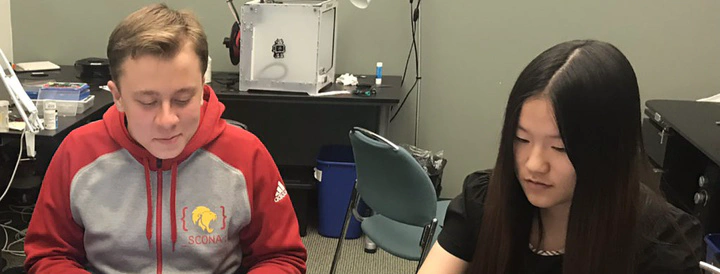Three high schoolers bring a unique perspective to developing Juypter notebooks

Internships offer students real-life work experience in a prospective career field. This past summer, four high school interns joined Callysto’s development team to gain some real-world experience, while helping to provide a unique student perspective on five of Callysto’s learning modules.
In this post, we spoke to three of our interns (Chloe Coleongco, Noah Gergel, Wenyi "Krystal" Hu) on how they were able to bridge their passions for coding and learning through the Callysto experience.
What did you learn while working on the Callysto project?
"The projects offered us the ability to learn more about Python, open data, and how to use computational thinking to teach subjects, such as chemistry, math and life skills courses."
– Wenyi "Krystal" Hu
What is your favourite part of being involved in the Callysto project?
"For me, I am getting to creating content that will actually be used in high schools across Canada. Most importantly, I’m able to learn real-world skills that will help me in my future career."
– Chloe Coleongco
What makes this experience different from other projects you have worked on?
"The best thing about my internship with the Callysto project is that I get a lot of hands-on experience with Python, and that means I will be one step ahead of my future computing science classmates."
– Wenyi "Krystal" Hu
What work did you do on the Callysto project?
"The primary focus of our internship was to develop, code and write learning modules for Chemistry 20 and Career and Life Management [a course designed "to enable students to make well-informed decisions in life"]. We developed numerous notebooks that detailed the history of the Gas Laws, and provided experiments related to how to teach these materials. This kept us busy for the full six weeks. It was an extremely interesting and rewarding experience."
– Noah Gergel
What was the biggest challenge of this project?
"The biggest challenge for me, but also one of the best parts, was that the nature of the work was extremely open-ended. I had to come up with ideas about how to write a specific module on the gas laws, and then I would code it into a Juypter notebook, without any additional input apart from my fellow interns."
– Noah Gergel
What was it like to work as a developer for the summer?
"The work I did was challenging and interesting, and everything I did contributed to helping my fellow students learn something new, which is a great feeling. I really couldn’t have asked for a better experience."
– Chloe Coleongco
How hard is it to learn Python?
"For some, it might be a bit of a leap to learn Python. But that’s why we created the "narrated" coding within the learning modules. It gives both the teacher and students the ability to learn for themselves how different functions work."
– Wenyi "Krystal" Hu
Advice to future users
Cleongco, Greggerler and Hu all said they believe Callysto is the future of learning online. For those new to the platform, they agree that the best way to approach Callysto is to treat it as both an online textbook and a multi-modal learning platform.
As part of the internship final project, the team created this amazing poster capturing their contributions to Callysto and the Callysto initiative as a whole.
Our thanks to the interns who supported Callysto through the University of Alberta’s High School Internship Program, as well as Professor Eleni Stroulia, who kindly loaned her group of interns to Callysto.